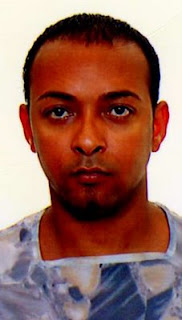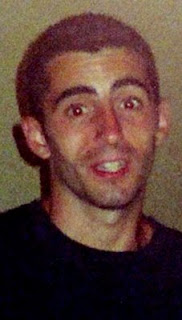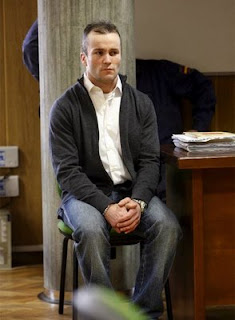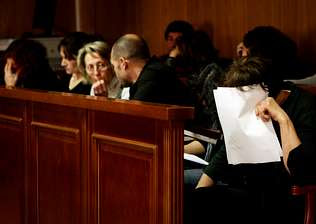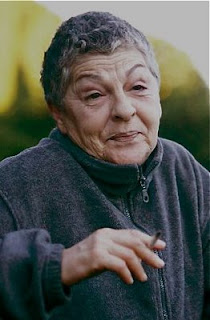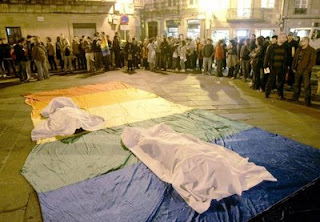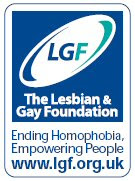- Facebook status update, Fri., March 6th, 10:24 am: "Organizing my life..."
- Facebook schedule update, Fri., March 6th, 6:45 pm: Attending March 14th forum on "The legal advances for same-sex couples in Colombia" organized by Colectivo Tinku in Cali, Colombia.
Yesterday, as I was writing my post on the various demonstrations calling for justice in the murder of a gay couple in Spain, I was trying to find good online image galleries of the protest in Vigo, which was said to have drawn up to 2,000 people.
I found some articles but no good galleries. And then, for some reason, Google pulled up this headline from Colombia's
El Espectador: "
Pole LGTB leader murdered."
My heart sank. I swear I knew exactly who it would be even before I clicked on the link. But it still didn't lessen the shock or dismay when my fears were confirmed.
I was lucky enough to meet
Alvaro Miguel Rivera a couple of times when he visited the United States. We'd been in touch before, of course, based on his extraordinary and enduring determination to fight for the rights of LGBT individuals and HIV positive people in what could be called one of the most homophobic regions in the country:
El llano oriental (Colombia's rural eastern plains).
That's actually the reason I found out about him.
Back in 2001, Alvaro was living in Villavicencio, Meta, in a region set aside by the government as a 'safe haven' zone where FARC guerrilla members could walk around without fear of government intervention (it was part of a failed effort to reach peace with the armed insurgents). Alvaro, who had finished a degree in Agricultural Engineering, worked in a region known for it's cattle ranches and was already known as a public advocate for sexual minorities and those who were HIV positive.
He loved Villavicencio, not the least because his family lived there. But, as FARC troops began to move in, Alvaro began to receive anonymous phone calls, felt he was being followed by strangers, and reported harassing calls to his employers with the intent to tarnish his reputation. In April of 2001, he finally reported it to the local authorities and they told him that they could only wait until something actually happened to take any action. Police only began to investigate when Alvaro went public sending a series of e-mail messages to different organizations (at the time, I translated some of them on his behalf, and alerted human rights organizations in the United States, including IGLHRC).
All this in a worsening environment for those in the area who were HIV positive. In October of 2001,
El Tiempo reported that the FARC had begun to require local residents to get tested for HIV and were giving a week-long ultimatum for people who tested positive to leave the region.
A week after the article was published, Alvaro actually reported having attended a meeting held between local hospital personnel and members of the FARC in which the FARC agreed to temporarily suspend the program. El Tiempo had reported that by then, they already had access to testing equipment and had tested more than 3,ooo individuals for HIV.
The 'safe haven' zone might have been lifted since then, but the death threats and harassment against Alvaro continued, forcing him to leave a place he loved so much. He decided to move to Cali - the third largest city in Colombia, following Bogota and Medellin - where he became the Director of
Colectivo Tinku, a local LGBT rights organization.
He also became one of the founders and leaders of the local gay chapter of the
Alternative Democratic Pole political party (which is why, the moment I read "Pole LGBT leader murdered" headline, I feared it might be Alvaro).
The article just said that the national Alternative Democratic Pole had released a statement in which they condemned his "brutal" murder on Friday night,
As of late, we had reconnected through, what else! - Our
Facebook profiles! The article on his murder actually offered very few details so I went to
his Facebook page and got confirmation that, indeed, it was Alvaro who'd been killed.
I've been in touch with a mutual friend and he says that he was found murdered in his apartment around 10pm and that police are currently investigating the crime. He died violently but I'll keep details to myself since they have not been published and the authorities might not want some of them to be made public as they begin the investigation.
There have been incredible advances as of late in the recognition of LGBT rights in Colombia which have resulted in several Constitutional Court rulings that have extended a series of protections to same-sex couples in the country - just short of recognizing the right to marry or to enter into a civil union.
One right that heterosexual couples enjoy but is denied to same-sex partners in Colombia is the right to adopt.
In a note Alvaro posted on
February 2nd, he writes about his desire to be a father. An edited excerpt:
Today when I approach the fourth floor [his 40's] at a velocity which I cannot control and I feel the joy of maturity and the peacefulness I feel in being alone, I confronted an emotion similar to that [I felt when I turned 30].
I'd been out shopping, killing time in a shopping mall, bartering prices, and enamoring myself of things I cannot buy; all of a sudden I found myself in a store with things for babies and kids.
I noticed a baby's bed, a dining table, clothing for a newly born, toys, rattles, napkins, one and another photo album - I imagined what my baby would have been like, all chubby with straight dark hair, restless eyes and a cry-baby... I was so excited and engrossed in my longing, when a Ms. said to me "if it's a boy, you have to buy everything in blue, if it's a girl, you have to buy everything in pink". Without thinking what I was saying, I said "Lady, thanks for the suggestion. It will be a boy and I will buy everything in pink." Perhaps I was too harsh in my response because the lady left without replying.
[...]
Once I was back and with the silence of the apartment, I asked myself if I was a frustrated dad and if I had repeatedly denied myself the possibility of being a father, of seeing a child grow up, of bringing him a future.
If I wanted to be a father today in Colombia, I could not be one unless I renounced to being Gay, even if I love women I do not see myself having a penetrative relation to obtain my objective of becoming a father, I also don't think my dick would work.
The only [way] is that the Colombian government grant me the right enjoyed by any other citizen of this country to adopt a child, or various children. I think that I would be a good father, a bachelor father, of course. But the Colombian government is not entertaining [an option for] Gay, Lesbi, Trans persons to adopt.
Adoption rights for gays in Colombia might still become a reality if not before Alvaro died. And I found it truly moving - and sad- to read his thoughts on the possibility of becoming a father. That was pure Alvaro, mixing the personal with the activism, giving it such a human angle.
After years of being an out and proud gay man in the most difficult of circumstances and even under the threat of being killed, I also find comfort that Alvaro felt, as he expressed in the note, that he had reached a stage in which he felt "the joy of maturity and the peacefulness [of being alone]".
He is a tremendous loss to the international human rights movement and will be sorely missed. His family will be taking his body back to Villavicencio to fulfill his wish that, one day, he could be able to return to his beloved
llanos. Rest in peace, Alvarín.
Update (3/10/09): In Alvaro Rivera's murder, advocates demand a hate crime investigation (Blabbeando)
Update (3/9/09): El Tiempo reports that Alvaro, who was 41, spent a few years in exile in Costa Rica due to death threats and had returned to Colombia five years ago. According to the Alternative Democratic Pole, he was still receiving death threats after settling in Cali. The paper says that
the crime "was reported by a neighbor who found him with his hands tied and with a blow to the head."
Cali's El País, which surprisingly has only ran a blurb on the murder, says that the room had been turned upside-down but that the door had no signs of having been forced open.
El Tiempo also says of Alvaro:
Rivera was part of the June Unity Association; organized 'Process T'; was the founder of Colectivo Tinku, gave support to the the organizing of the "Leaders of the LGBT Sector" organizational gathering, and was a founder of Cali's Third LGBT Pride March.
He participated in national initiatives such as Planet Peace, was one of the founders of the National Colombian Network of People Living w/HIV (RECOLVIH) and established contacts in Mexico and Spain related to the issue of social inclusion o the LGBTI sector.
In the last tri-mester of 2008 he started the "Cali, city without limits: Territory of Social Inclusion" of Cali's Mayor's Office.
Germán Humberto Rincón Perfetti, one of the leading legal advocates on LGBT issues in Colombia, and a close friend of Alvaro's, released a statement in which he calls it a "hate crime" and alludes to hypotheses that Alvaro might have invited the persons who killed him into his apartment (it's a literal translation so some passages might read a bit awkward in English):
The hate crime [committed against] Alvaro Miguel Rivera, an activist living with HIV and [who was] homosexual in Cali, Colombia, has us heartbroken; nevertheless this is a reality that has always been present for many years, in many cities of Colombia and the world (remember the crime against Versace, the designer, in Miami).
To engage in prevention so that homosexual men do not take other men to their place of residence is not the solution. All people have the right to make use of a non-reproductive recreational sexuality, nevertheless this does not justify a hate crime, as rape of a woman cannot be justified by her wearing a mini-skirt or for sensually showing her breasts or other attributes.
We have received and will receive many more messages of repudiation, nevertheless **I MAKE A CALL FOR ENGAGING IN STRUCTURAL ACTIONS at the local level (government offices at state capitals) and the national level.
We demand urgently that the Prosecutor's Office create a hate crimes unit and study and investigate our [crimes] within the agency.
We demand that Congress, the Prosecutor's Office, the Police and other administrative entities on a national level, submit reports on the issue, in order to question the OMISSION of the Government, elicit expectations, put the issue on the public and political agenda.
To meet at local City Councils, seek funding to engage in prevention, sustain 24-hour help lines, and actions in which it is understood that more than 99% of the people in our community live and act in the closet, which reacquire actions according to the real life situation, to study circumstances of vulnerability, which make us objects of these persons and gangs who believe that with these crimes they do a favor to the world by finishing-off one more, as when travestis and homeless people are murdered, and which are done in what is called "social cleansing".
To make public that there exist public discourses that help to feed these crimes and to ask that they stop causing us harm.
It's necessary to call for meetings in the cities in which we host activists in order to develop a short-, medium- and long-term PLAN.
Alvaro Miguel, what hurt!!!!!!!!
- Germán Humberto Rincón Perfetti
Bogota, Colombia
Related (English):
- Spanish language internet video interview with Alvaro, posted on Terra.com's gay portal TodoGay.com back in June 20th, 2008, in which he responds to questions about his LGBT activism in Colombia.
Related (Spanish):
 Years after retiring, the two greatest soccer players in history are suddenly in the midst of a nasty pissing match.
Years after retiring, the two greatest soccer players in history are suddenly in the midst of a nasty pissing match.















